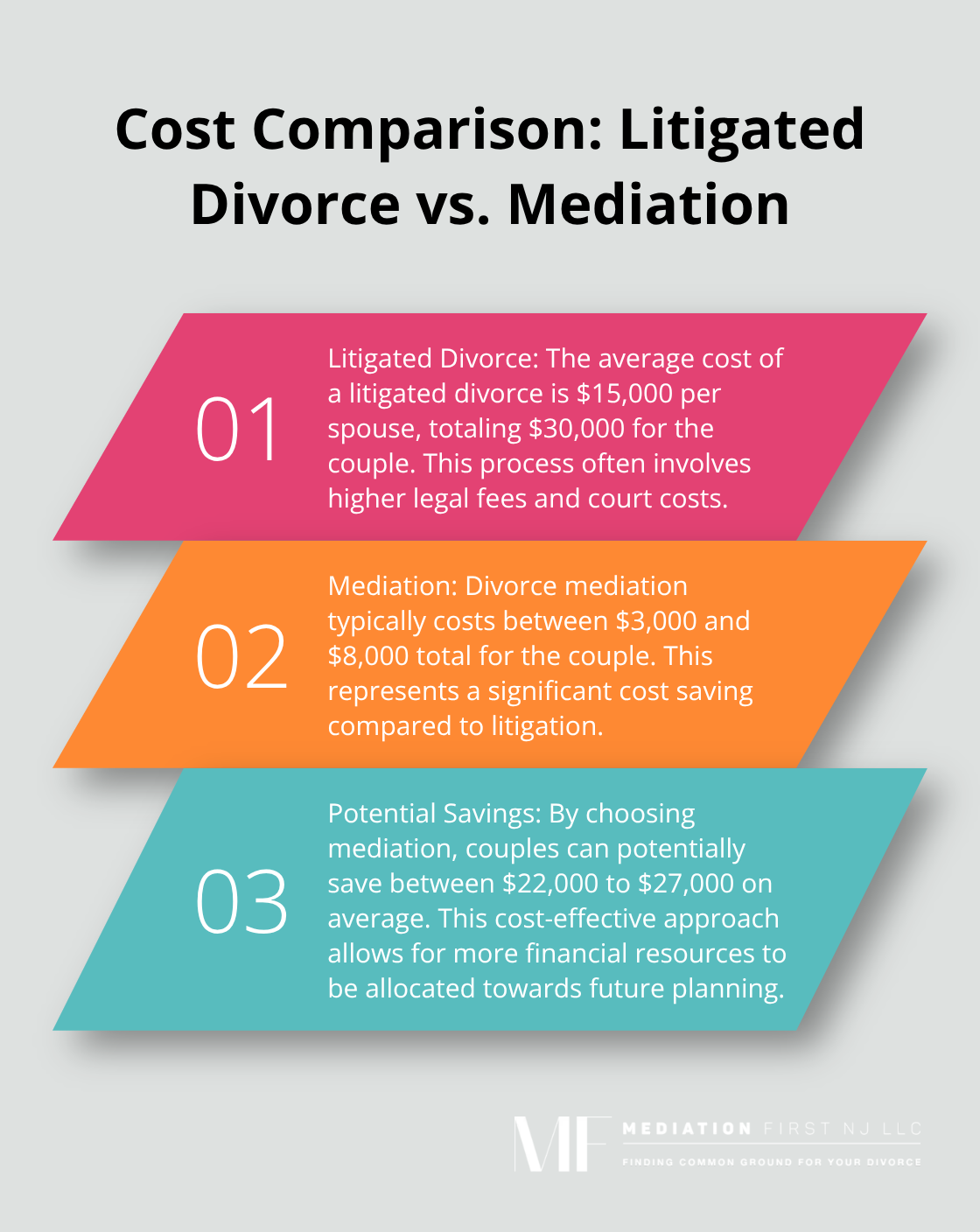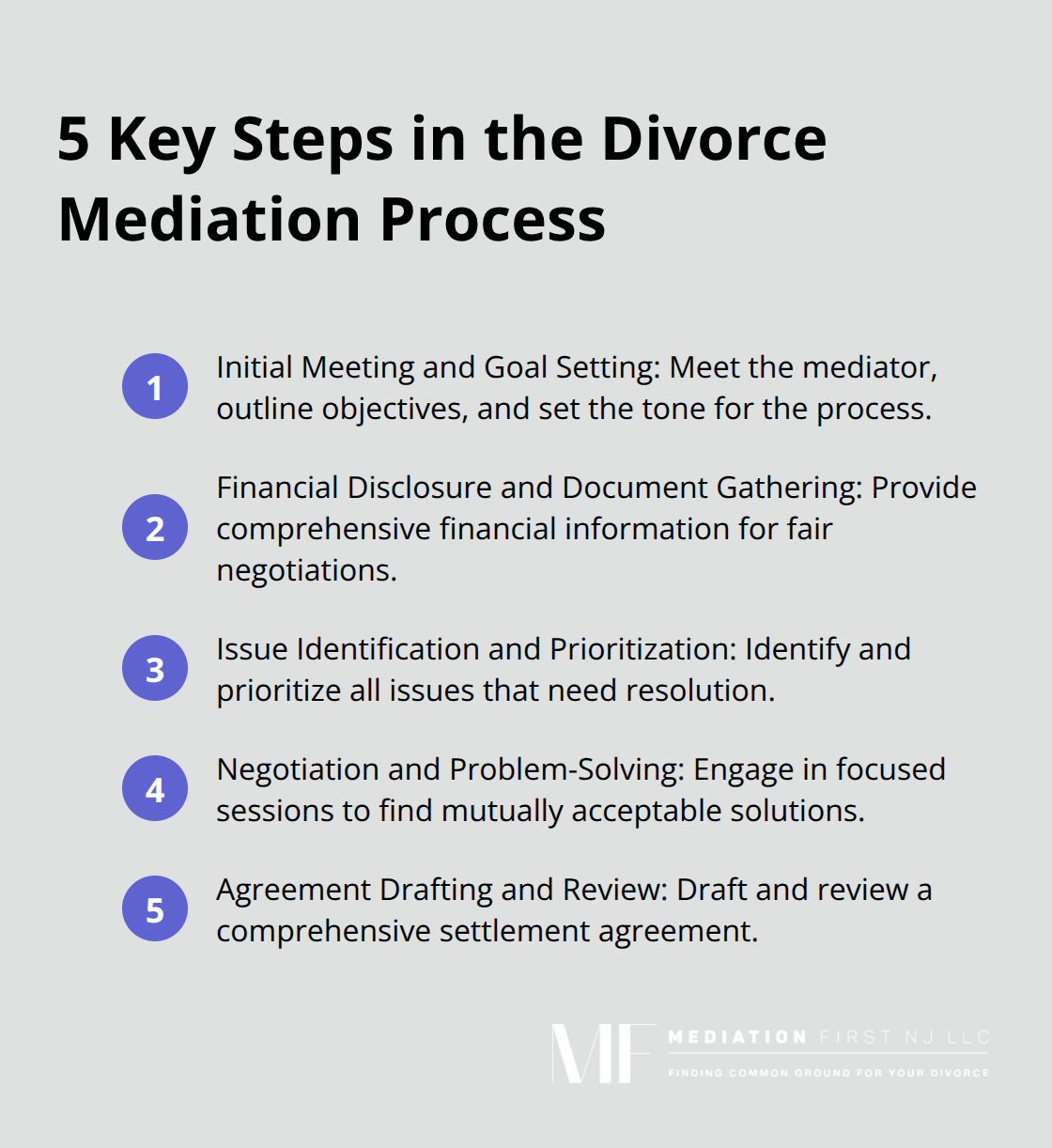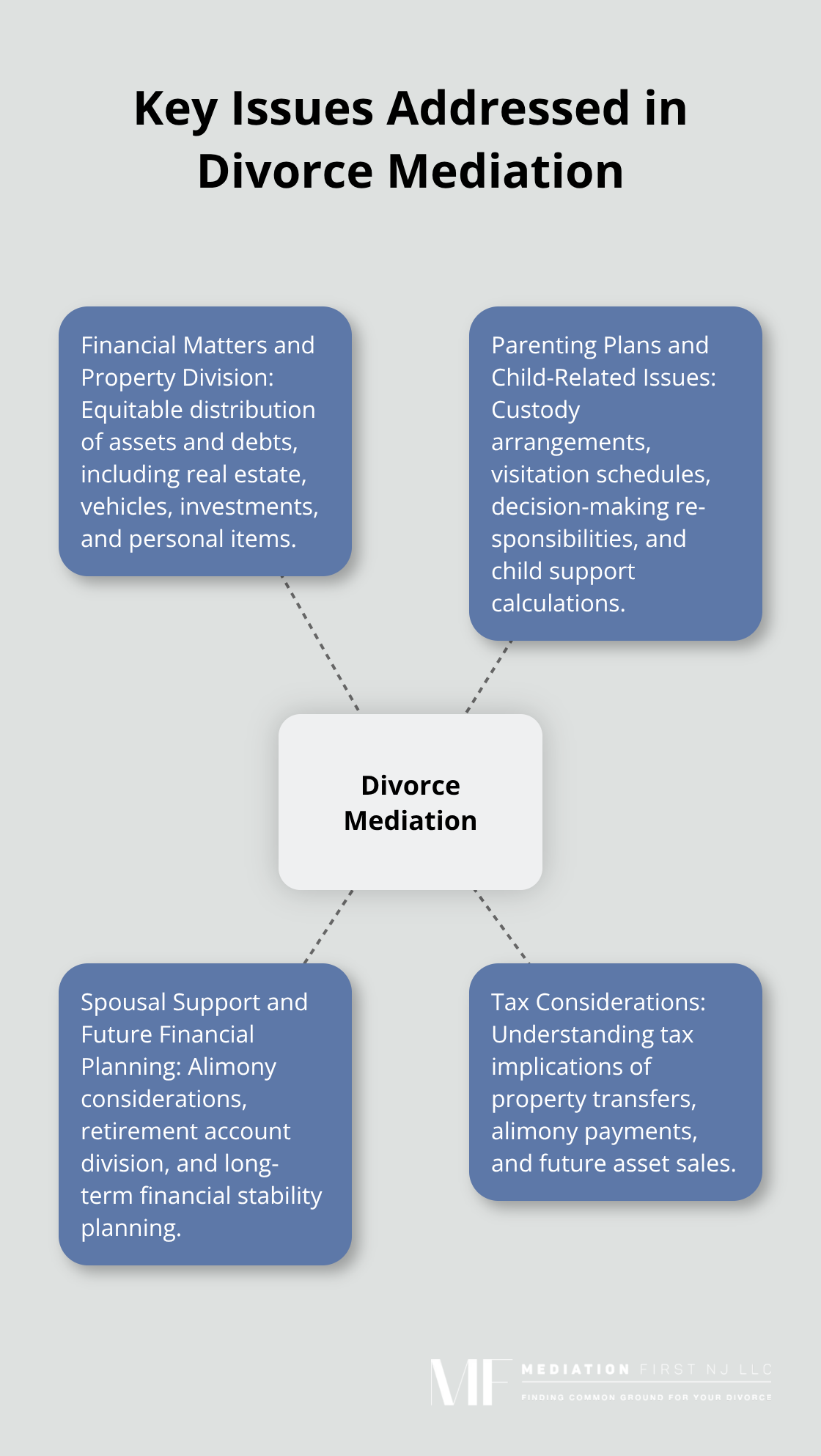Divorce can be a challenging and emotionally charged process. At Mediation First NJ LLC, we believe that understanding the mediation process for divorce is crucial for couples seeking a more amicable resolution.
This blog post will guide you through the steps of divorce mediation, highlighting its benefits and key issues addressed. We’ll also provide insights on how mediation can lead to a smoother, more cost-effective divorce experience.
What Is Divorce Mediation?
A Collaborative Approach to Divorce
Divorce mediation represents a cooperative process where separating couples work with a neutral third party to resolve their disputes. This approach transforms potentially contentious situations into constructive dialogues. Unlike traditional litigation, where attorneys argue on behalf of their clients in court, mediation puts the decision-making power in the hands of the couple. The mediator facilitates discussions, provides information, and helps identify mutually beneficial solutions. This collaborative approach often leads to more satisfying outcomes for both parties.
Cost-Effective and Time-Efficient
One of the most significant advantages of mediation is its cost-effectiveness. A study by the National Center for State Courts revealed that the average cost of a litigated divorce is $15,000 per spouse, while mediation typically costs between $3,000 and $8,000 total. Many couples navigate their divorce for a fraction of the cost of litigation through mediation.

Preserving Relationships
The non-adversarial nature of mediation helps preserve relationships (particularly important when children are involved). A study reevaluated the long-term effects of divorce mediation on adults’ psychological adjustment and investigated the relations among coparenting.
Confidentiality and Control
Mediation sessions offer confidentiality, unlike court proceedings which become part of the public record. This privacy allows couples to discuss sensitive issues openly without fear of public exposure. Additionally, mediation gives couples more control over the outcome of their divorce. Instead of a judge making decisions for them, they can craft solutions that work best for their unique situation.
Flexibility and Customization
Mediation offers flexibility that traditional court processes lack. Couples can set their own pace, schedule sessions at convenient times, and address issues in an order that makes sense for their situation. This customization allows for creative problem-solving and often results in agreements that are more tailored to the family’s specific needs (as opposed to one-size-fits-all court orders).
As we move forward, let’s explore the specific steps involved in the divorce mediation process, which will provide a clearer picture of what to expect when choosing this path.
How Does the Divorce Mediation Process Work?
At Mediation First NJ LLC, we guide couples through the divorce mediation process. Here’s a practical breakdown of what you can expect:

Initial Meeting and Goal Setting
The process starts with an initial meeting where both spouses meet the mediator. This session sets the tone and outlines objectives. We encourage couples to prepare a list of issues they want to address. The mediator explains the process, answers questions, and helps identify key areas of focus.
Financial Disclosure and Document Gathering
The next step involves financial disclosure. Both parties must provide comprehensive financial information, including:
- Income statements
- Bank account details
- Property valuations
- Retirement account information
- Debt statements
This step ensures fair negotiations. We recommend organizing these documents before mediation begins (this can significantly streamline the process).
Issue Identification and Prioritization
With financial information available, the mediator helps identify all issues that need resolution. These typically include asset division, debt allocation, child custody, and support arrangements. We work with couples to prioritize these issues, often tackling easier topics first to build momentum.
Negotiation and Problem-Solving
Negotiation sessions form the core of mediation. These meetings focus on finding mutually acceptable solutions to each identified issue. Our mediators use various techniques to facilitate productive discussions, such as:
- Encouraging open communication
- Reframing contentious points
- Suggesting creative compromises
On average, couples complete mediation in 3-4 sessions (though complex cases may require more).
Agreement Drafting and Review
Once couples reach agreements on all issues, the mediator drafts a comprehensive settlement agreement. This document outlines all decisions made during mediation. We strongly advise each spouse to have independent attorneys review this agreement before signing. This step ensures that both parties fully understand the terms and implications of the agreement.
The mediation process aims to create a fair, workable agreement that meets both parties’ needs. Couples who approach the process with openness and willingness to compromise often achieve more satisfying and sustainable outcomes than those imposed by a court. As we move forward, let’s explore the key issues that mediation typically addresses in divorce cases.
What Issues Does Divorce Mediation Address?
Divorce mediation tackles a wide range of complex issues that arise during the dissolution of a marriage. We guide couples through these challenging topics to reach fair and sustainable agreements.

Financial Matters and Property Division
One of the most significant aspects of divorce mediation is the division of assets and debts. This process involves a thorough inventory of all marital property, including real estate, vehicles, investments, and personal items. We help couples navigate the complexities of property valuation and equitable distribution.
In New Jersey, the concept of equitable distribution doesn’t necessarily mean a 50/50 split. Factors such as the duration of the marriage, each spouse’s economic circumstances, and contributions to the marital estate are considered. Mediators facilitate discussions to ensure both parties understand their rights and options.
Debt allocation is equally important. Credit card balances, mortgages, and personal loans acquired during the marriage are typically considered shared responsibilities. We assist in creating a plan for debt repayment that’s fair and manageable for both parties.
Parenting Plans and Child-Related Issues
For couples with children, creating a comprehensive parenting plan is essential. This plan outlines custody arrangements, visitation schedules, and decision-making responsibilities. We encourage parents to focus on their children’s best interests, helping them develop flexible schedules that accommodate work commitments and children’s activities.
Child support is another critical issue addressed in mediation. In New Jersey, child support calculations are based on the state’s guidelines (which consider factors such as each parent’s income, the number of overnights each parent has with the children, and additional expenses like healthcare and education costs). Our mediators help parents understand these guidelines and negotiate agreements that ensure children’s needs are met.
Spousal Support and Future Financial Planning
Alimony, or spousal support, is often a contentious issue in divorce. We help couples navigate this sensitive topic by considering factors such as the length of the marriage, each spouse’s earning capacity, and the standard of living established during the marriage. Our goal is to reach an agreement that provides financial stability for both parties post-divorce.
Retirement accounts and pensions require special attention. These assets often represent a significant portion of a couple’s wealth and have complex tax implications. We guide couples through the process of valuing and dividing these accounts, including the use of Qualified Domestic Relations Orders (QDROs) when necessary. For mediation to be effective in dividing retirement accounts, both parties must fully disclose all their financial assets.
Tax Considerations in Divorce Settlements
The tax implications of divorce settlements can be substantial. We educate couples on how different decisions can impact their tax liabilities. For instance, the tax treatment of alimony payments changed significantly with the Tax Cuts and Jobs Act of 2017. Beginning January 1, 2019, alimony or separate maintenance payments are not deductible from the income of the payer spouse, or includable in the income of the recipient spouse. Understanding these changes is important for making informed decisions during mediation.
Property transfers between spouses as part of a divorce settlement are generally not taxable events. However, the future sale of assets, particularly the marital home, can have significant tax consequences. We help couples consider these long-term implications when dividing property.
Final Thoughts
Divorce mediation offers a path to resolution that prioritizes cooperation and customized solutions. The mediation process for divorce empowers couples to make informed decisions about their future. This approach often leads to more efficient, less emotionally taxing, and more cost-effective outcomes compared to traditional litigation.
A qualified mediator plays a vital role in the success of the process. They bring expertise in family law, negotiation techniques, and conflict resolution to guide discussions and ensure fair participation. We at Mediation First NJ LLC provide professional mediation services tailored to each family’s unique needs (helping New Jersey residents find amicable solutions to their divorce-related disputes).
Mediation benefits extend beyond immediate resolution of divorce issues. Couples who engage in mediation often report better post-divorce relationships, particularly valuable for co-parenting. The skills learned during mediation serve as valuable tools for managing future disagreements and transitions. Choosing mediation as a first step can set the tone for a more positive and productive separation process.

